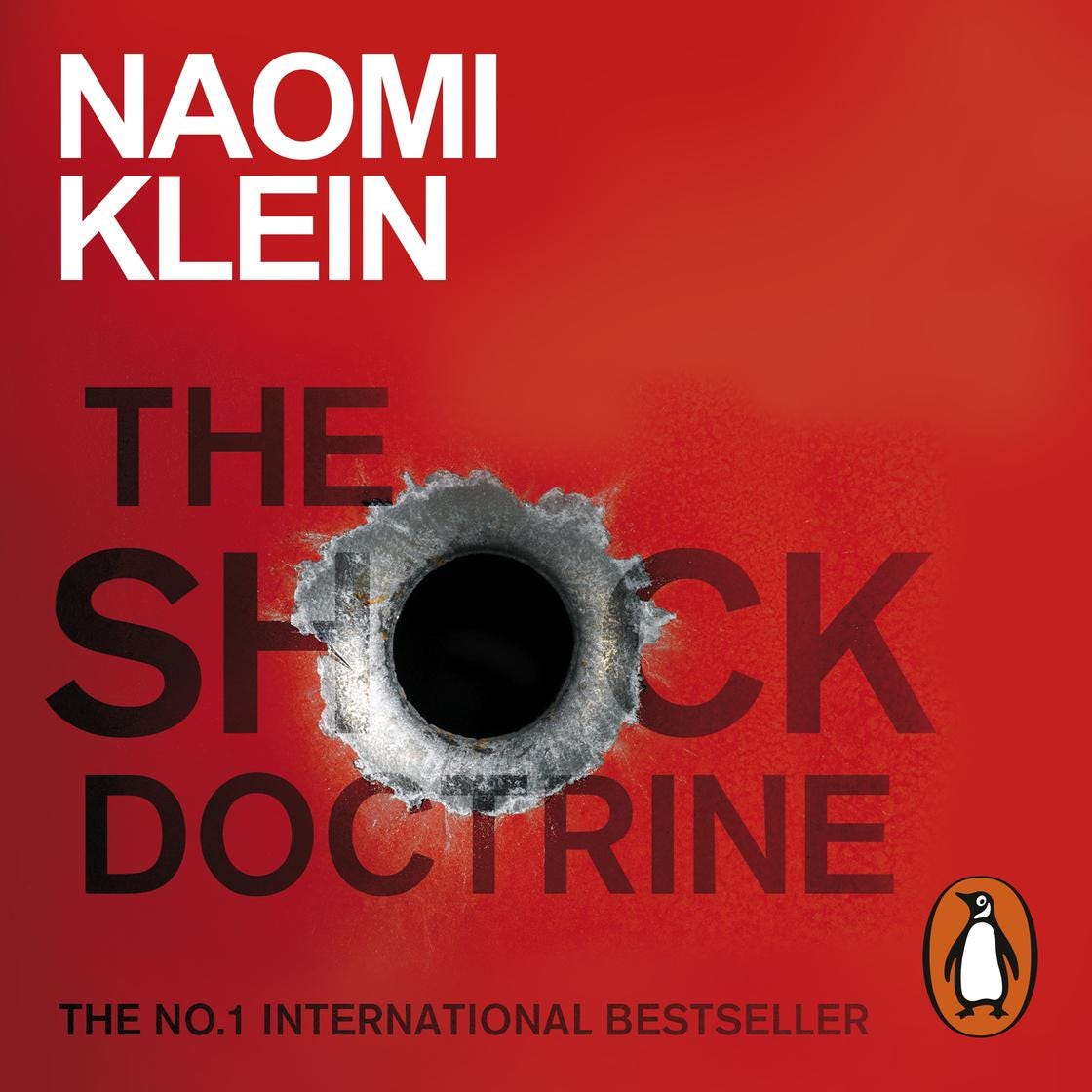“Shock and Awe, Inc.”
How Disaster Became a Business Model — and What That Means for What Comes Next
Let’s get one thing out of the way: The Shock Doctrine is not a subtle book. Naomi Klein writes like a prosecutor delivering her closing arguments to a jury she knows is half-asleep and half-complicit. Good. They are.
What Klein lays out, with relentless detail and mounting rage, is the scaffolding of a system many of us already suspected existed but didn’t have the receipts for. Now we do.
The thesis is straightforward: economic elites, corporate predators, and neoliberal ideologues have weaponized crisis—war, natural disasters, coups, financial meltdowns—not as unfortunate interruptions to prosperity, but as opportunities to remake the world in their image. Deregulation. Privatization. Displacement. The sale of the commons. Austerity for the masses and bonanzas for the cronies.
Call it disaster capitalism. Call it looting in a tailored suit.
(I’ve started calling it “The Great Extraction,” which is why I’m writing my own book as a thesis to follow on Naomi’s brilliant analysis.)
But here’s the uncomfortable part: the public—numb, scared, sedated—goes along with it. Every time. From Pinochet’s Chile to post-Katrina New Orleans, from the "liberation" of Iraq to the bailout of Wall Street, the script is the same: trauma creates a window of disorientation, and in that window, the restructuring begins. Not to rebuild, but to extract.
Klein doesn't argue that shocks are manufactured (though sometimes they are). Her point is more devastating: they’re anticipated. Exploited. Built into the business model. And once the model is in place, you start to wonder whether the disasters are bugs—or features.
Sound familiar?
We are now living in a world that’s been “restructured” a few too many times. It’s no longer a question of whether we’re in crisis. The only question is: whose crisis is this—and who profits?
And while Klein stops short of spelling it out, the book has aged into prophecy. COVID? A massive upward transfer of wealth, permanent expansions of surveillance power, and a broken workforce yoked to the gig economy. Climate disaster? A gold rush for carbon speculators and desalination billionaires. The next financial collapse, the next war, the next “existential emergency”? They’re not being prepared for. They’re being priced in.
But what if I told you it’s worse now?
What Klein saw as opportunism has metastasized into design. What she chronicled as momentary disruption has calcified into systemic function. And what she hoped could be reversed through protest and public outcry now looks more like a rigged machine you can’t vote your way out of.
Welcome to The Great Extraction. You’ve been living in it.
You just didn’t have the name yet.
🚪 What’s Behind the Paywall:
We’re not in the age of disaster capitalism anymore. We’re living in something far more permanent: a gamified, opt-in extraction engine that doesn’t need a crisis to rob you—it just needs your password.
In the full piece, I break down:
How Klein’s theory has evolved from “shock” to system design
Why modern collapse doesn’t require coups—it just requires your consent
What’s really happening to your data, debt, agency, and autonomy
Why the commons aren’t coming back—and what to do about it
The Shock Doctrine was a warning.
The Long Memo is the obituary.
Read on to understand how to opt out, before you’re sold off piece by piece.


